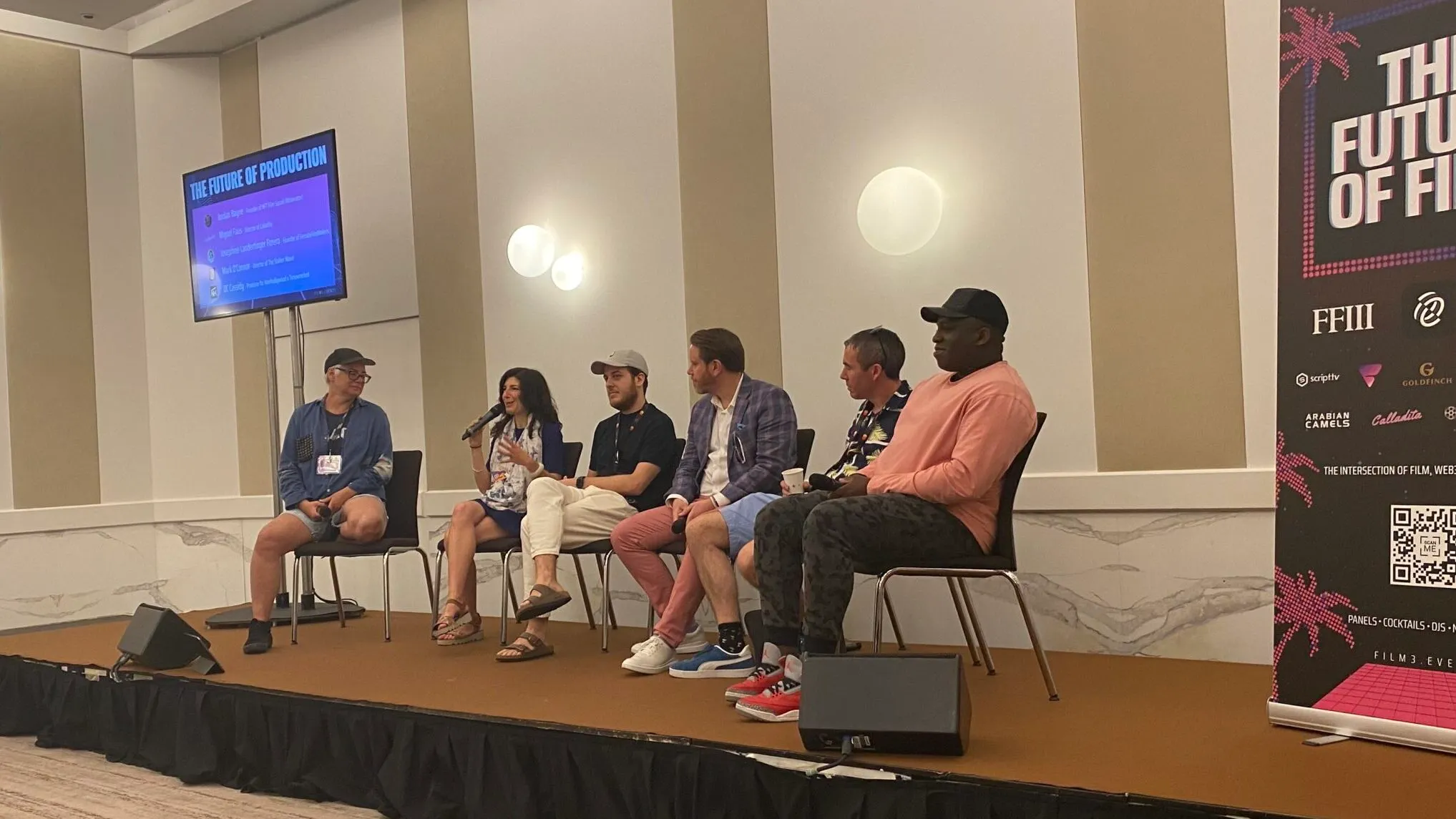Think of the Cannes Film Festival and you’re probably picturing Hollywood stars disembarking from boats and wafting up the red carpet.
The reality is a bit less glamorous; away from the premieres and beach parties, it’s a glorified sales market, where independent film companies tout their slates to mid-ranking execs at distributors.
Which makes it a good place to see which way the wind is blowing in the film business. And this year, there was a definite hint of crypto in the breeze off the Med.
There were splashy, high-profile appearances from the crypto community’s leading lights; Binance CEO CZ turned up at a premiere before serving slices in a local pizzeria to mark Bitcoin Pizza Day (a couple of days early), while metaverse platform The Sandbox and Bitcoin OG Charlie Shrem both hosted beach parties; the latter to launch a crypto-powered film financing platform.
Thanks to Mister Pizza for letting us use the shop, and teaching me how to make the pizza. pic.twitter.com/Dbe5AQBB2d
— CZ 🔶 Binance (@cz_binance) May 20, 2022
But as with the festival itself, the real action was happening away from the crowds, in conference rooms and corridors.
Cannes Next, the festival’s business innovation strand, hosted an “NFT Showcase and Business Brunch,” promising to showcase “what opportunities NFTs can offer to creators, producers, financiers, and studios.”
At a Future of Film event hosted by Decrypt and Web3 filmmaking platforms FF3 and Decentralized Pictures, panelists from across the crypto and film industries took to the stage to discuss how Web3 would change film funding, production and distribution.
For Phil McKenzie of FF3, it’s still very early days for Web3 filmmaking. “There are a few companies out there raising funds, that have set their mission out,” he said. “Now it’s about getting money into productions and actually seeing the practical emergence of what they’re creating. At the moment, it’s still only a handful of projects that have been successful.”
One of the highest-profile projects to have raised funds through crypto is director Miguel Faus’ feature film “Calladita,” which counts among its backers NFT collection Nouns DAO. “The Web3 revolution is definitely coming to film,” Faus told Decrypt. “No other art form is as centralized as cinema, and so no other art form is as prone for a decentralization revolution as cinema. This is unstoppable.”
For James Mackie of crypto crowdfunding platform MovieCoin, Web3’s biggest impact will be to create new routes into the film industry. “A budding film producer doesn’t have to have anything, no experience, and we can get it made,” he said. “The crowd will upvote the movie that they’d like to see made.”
A more diverse cinema
On a similar note, Faus argued that Web3 will allow filmmakers whose stories currently “go untold,” to “rally a community behind them,” using crypto and NFTs, ultimately leading to “a more diverse cinema.”
That includes opening the door to more diverse voices; something that director and producer Josephine Landertinger Forero has been pioneering with her Web3 movement Femalefilmmakers.xyz and its NFT collection Female Filmmakers: Female Gaze.
“It’s female artists that did a piece about women working in the film industry, or their vision of what is the female gaze, what it means to them,” she explained. “And with the sales of these NFTs, we are funding a short film that has to have 100% female crew and cast.”
The long-term vision, she said, is for the community to become a self-sufficient film fund for first-time female filmmakers. “NFTs and crypto go direct to community and cut away middlemen,” she added. “That’s the way to get our stories told.”

“Web3 can systemize the opportunity for surprising voices and creators to be found in places that we would least expect it,” agreed DC Cassidy, founder of Web3 film studio NextHollywood.
He added that by creating communities around Web3 tools like NFTs, filmmakers can get “direct buy-in with their community to get feedback from them.” He pointed to the example of Mila Kunis’ NFT animated series “Stoner Cats,” where “token holders will directly get to decide what happens with the story-level choices.”
Web3 communities could impact the nuts and bolts of production, too, said Mike Musante of Decentralized Pictures. “You could go out and at a moment’s notice, query a community with two versions of a scene, A/B test it, put up a bounty, and say, ‘We’re going to pay you x thousand dollars worth of our crypto, and you give us your feedback about the two different scenes.’”
Keep it simple, stupid
Still, to gain more widespread acceptance in the film industry, Web3 pioneers need to frame the technology in more easily-understood terms, said Cassidy. “I’m already starting to call NFTs 'access passes,'” he said, reaching for the language of video games. “I think it’s a way of language that the big studios we’ve talked to, the talent we’ve talked to, can wrap their heads around more.”
🔥TODAY 4pm BST 👉🏽 FF3 FFC🔥@PAWmckenzie @NickSadlerNSDMT & @stephengraves will be covering a seminal moment for Film3 at the Cannes Festival & launch of @Film3Events 🚀
Pls come and join & share your festival Film3 experiences 🙏🏽https://t.co/3KiXLaN8DA
— First Flights & FF3 (@firstflightspro) May 27, 2022
Mihai Crasneanu, CEO of Web3 streaming platform Beem, agreed that language is a barrier to Web3 adoption.
“Back in the days when the internet started, people would talk about TCPIP, SMTP, HTML, in the same phrase as ‘You should be on the internet,’” he said.
Now, “We have to come up with names like NFT and Web3 because something is new—but nobody cares. It's about watching a movie, supporting your creator and engaging in some form that's easy to do for everyone. If people want to use their Facebook accounts and the credit card and Apple Pay, let them do that. And it's up to us to work on great interfaces to make the transition simple.”

Spreading the word about Web3 technologies in the film industry will require a grassroots effort; something that Warrior Love Productions is pioneering with Mintworthy. The initiative, in conjunction with NEAR Foundation, will award filmmakers $10,000 grants to make short films that “inspire disruptive innovation and social change.”
The recipients will have to complete a Web3 education course that involves creating NFTs to support the film. “We’re also providing a Web3 education, a curriculum, mentorship,” founder Melissa Jun Rowley said. “We’re very supportive of artists in many different facets, whether they’re visual artists, musicians, filmmakers; we're here to help facilitate ownership of that and help these funding models be more realized.”
Ultimately, said Camila Russo, whose book The Infinite Machine is being adapted into a feature film part-funded by NFTs, the march of Web3 into the film industry is unstoppable.
“Web3 is here,” she said. “And I think it'll start to permeate into every industry; of course, film is not going to be excluded. And it's already happening. To me, it doesn't really matter whether the traditional film industry is ready.”
Image credit
Main image by plb06 licensed under CC BY-NC-ND 2.0.

